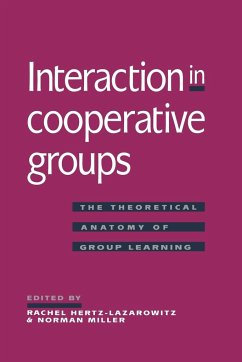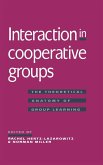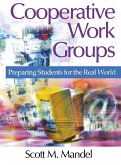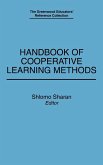Rachel Hertz-Lazarowitz / Norman Miller (eds.)The Theoretical Anatomy of Group Learning
Interaction in Cooperative Groups
The Theoretical Anatomy of Group Learning
Herausgeber: Hertz-Lazarowitz, Rachel; Miller, Norman
Rachel Hertz-Lazarowitz / Norman Miller (eds.)The Theoretical Anatomy of Group Learning
Interaction in Cooperative Groups
The Theoretical Anatomy of Group Learning
Herausgeber: Hertz-Lazarowitz, Rachel; Miller, Norman
- Broschiertes Buch
- Merkliste
- Auf die Merkliste
- Bewerten Bewerten
- Teilen
- Produkt teilen
- Produkterinnerung
- Produkterinnerung
Brings together related research from education, developmental psychology, and social psychology in an approach that is both integrative and analytical.
Andere Kunden interessierten sich auch für
![Interaction in Cooperative Groups Interaction in Cooperative Groups]() Interaction in Cooperative Groups108,99 €
Interaction in Cooperative Groups108,99 €![Cooperative Work Groups Cooperative Work Groups]() Scott M. MandelCooperative Work Groups71,99 €
Scott M. MandelCooperative Work Groups71,99 €![Learning from Others in Groups Learning from Others in Groups]() Cary L. CooperLearning from Others in Groups96,99 €
Cary L. CooperLearning from Others in Groups96,99 €![Faculty Groups Faculty Groups]() Susan A. WheelanFaculty Groups34,99 €
Susan A. WheelanFaculty Groups34,99 €![Teachers of Mathematics Working and Learning in Collaborative Groups Teachers of Mathematics Working and Learning in Collaborative Groups]() Teachers of Mathematics Working and Learning in Collaborative Groups38,99 €
Teachers of Mathematics Working and Learning in Collaborative Groups38,99 €![Ice Breakers; Games and Stunts for Large and Small Groups Ice Breakers; Games and Stunts for Large and Small Groups]() Edna GeisterIce Breakers; Games and Stunts for Large and Small Groups34,99 €
Edna GeisterIce Breakers; Games and Stunts for Large and Small Groups34,99 €![Handbook of Cooperative Learning Methods Handbook of Cooperative Learning Methods]() SharanHandbook of Cooperative Learning Methods84,99 €
SharanHandbook of Cooperative Learning Methods84,99 €-
-
-
Brings together related research from education, developmental psychology, and social psychology in an approach that is both integrative and analytical.
Hinweis: Dieser Artikel kann nur an eine deutsche Lieferadresse ausgeliefert werden.
Hinweis: Dieser Artikel kann nur an eine deutsche Lieferadresse ausgeliefert werden.
Produktdetails
- Produktdetails
- Verlag: Cambridge University Press
- Seitenzahl: 306
- Erscheinungstermin: 9. Dezember 2010
- Englisch
- Abmessung: 229mm x 152mm x 18mm
- Gewicht: 500g
- ISBN-13: 9780521483766
- ISBN-10: 052148376X
- Artikelnr.: 32924794
- Herstellerkennzeichnung
- Libri GmbH
- Europaallee 1
- 36244 Bad Hersfeld
- gpsr@libri.de
- Verlag: Cambridge University Press
- Seitenzahl: 306
- Erscheinungstermin: 9. Dezember 2010
- Englisch
- Abmessung: 229mm x 152mm x 18mm
- Gewicht: 500g
- ISBN-13: 9780521483766
- ISBN-10: 052148376X
- Artikelnr.: 32924794
- Herstellerkennzeichnung
- Libri GmbH
- Europaallee 1
- 36244 Bad Hersfeld
- gpsr@libri.de
Introduction: an overview of the theoretical anatomy of cooperation in the
classroom Rachel Hertz-Lazarowitz, Valerie Benveniste Kirkus and Norman
Miller; Part I. Developmental Foundations and the Social Construction of
Knowledge: 1. From convention to invention: three approaches to peer
interaction during writing Sarah J. McCarthey and Susan McMahon; 2.
Cooperative problem solving: a link to inner speech Barbara L. Bershon; 3.
Children's instrumental help seeking: its role in the social acquisition
and construction of knowledge Sharon Nelson-LeGall; Part II. Social Skills
and Classroom Factors Influencing Peer Interactions: 4. Understanding
interactive behaviours: looking at six mirrors of the classroom Rachel
Hertz-Lazarowitz; 5. Testing a theoretical model of student interaction and
learning in small groups Noreen M. Webb; 6. Scripted cooperation in student
dyads: a method for analysing and enhancing academic learning and
performance Angela M. O'Donnell and Donald F. Danscreau; Part III. The
Effects of Task and Reward Structure on Academic Achievement: 7. When and
why does cooperative learning increase achievement: theoretical and
empirical perspectives Robert E. Slavin; 8. Positive interdependence: key
to effective cooperation; Part IV. Factors Influencing the Promotion of
Positive Intergroup Relations: 9. Social categorisation and intergroup
acceptance: Principles for the design and development of cooperative
learning teams Norman Miller and Hugh J. Harrington; 10. The impacts of
role reversal and minority empowerment strategies on decision-making in
numerically unbalanced cooperative groups Geoffrey M. Maruyama, Sharon
Knechel and Renec Peterson; Conclusion: cooperative interaction:
implications of current research for classroom application Rachel
Hertz-Lazarowitz, Valerie Benveniste Kirkus and Norman Miller.
classroom Rachel Hertz-Lazarowitz, Valerie Benveniste Kirkus and Norman
Miller; Part I. Developmental Foundations and the Social Construction of
Knowledge: 1. From convention to invention: three approaches to peer
interaction during writing Sarah J. McCarthey and Susan McMahon; 2.
Cooperative problem solving: a link to inner speech Barbara L. Bershon; 3.
Children's instrumental help seeking: its role in the social acquisition
and construction of knowledge Sharon Nelson-LeGall; Part II. Social Skills
and Classroom Factors Influencing Peer Interactions: 4. Understanding
interactive behaviours: looking at six mirrors of the classroom Rachel
Hertz-Lazarowitz; 5. Testing a theoretical model of student interaction and
learning in small groups Noreen M. Webb; 6. Scripted cooperation in student
dyads: a method for analysing and enhancing academic learning and
performance Angela M. O'Donnell and Donald F. Danscreau; Part III. The
Effects of Task and Reward Structure on Academic Achievement: 7. When and
why does cooperative learning increase achievement: theoretical and
empirical perspectives Robert E. Slavin; 8. Positive interdependence: key
to effective cooperation; Part IV. Factors Influencing the Promotion of
Positive Intergroup Relations: 9. Social categorisation and intergroup
acceptance: Principles for the design and development of cooperative
learning teams Norman Miller and Hugh J. Harrington; 10. The impacts of
role reversal and minority empowerment strategies on decision-making in
numerically unbalanced cooperative groups Geoffrey M. Maruyama, Sharon
Knechel and Renec Peterson; Conclusion: cooperative interaction:
implications of current research for classroom application Rachel
Hertz-Lazarowitz, Valerie Benveniste Kirkus and Norman Miller.
Introduction: an overview of the theoretical anatomy of cooperation in the
classroom Rachel Hertz-Lazarowitz, Valerie Benveniste Kirkus and Norman
Miller; Part I. Developmental Foundations and the Social Construction of
Knowledge: 1. From convention to invention: three approaches to peer
interaction during writing Sarah J. McCarthey and Susan McMahon; 2.
Cooperative problem solving: a link to inner speech Barbara L. Bershon; 3.
Children's instrumental help seeking: its role in the social acquisition
and construction of knowledge Sharon Nelson-LeGall; Part II. Social Skills
and Classroom Factors Influencing Peer Interactions: 4. Understanding
interactive behaviours: looking at six mirrors of the classroom Rachel
Hertz-Lazarowitz; 5. Testing a theoretical model of student interaction and
learning in small groups Noreen M. Webb; 6. Scripted cooperation in student
dyads: a method for analysing and enhancing academic learning and
performance Angela M. O'Donnell and Donald F. Danscreau; Part III. The
Effects of Task and Reward Structure on Academic Achievement: 7. When and
why does cooperative learning increase achievement: theoretical and
empirical perspectives Robert E. Slavin; 8. Positive interdependence: key
to effective cooperation; Part IV. Factors Influencing the Promotion of
Positive Intergroup Relations: 9. Social categorisation and intergroup
acceptance: Principles for the design and development of cooperative
learning teams Norman Miller and Hugh J. Harrington; 10. The impacts of
role reversal and minority empowerment strategies on decision-making in
numerically unbalanced cooperative groups Geoffrey M. Maruyama, Sharon
Knechel and Renec Peterson; Conclusion: cooperative interaction:
implications of current research for classroom application Rachel
Hertz-Lazarowitz, Valerie Benveniste Kirkus and Norman Miller.
classroom Rachel Hertz-Lazarowitz, Valerie Benveniste Kirkus and Norman
Miller; Part I. Developmental Foundations and the Social Construction of
Knowledge: 1. From convention to invention: three approaches to peer
interaction during writing Sarah J. McCarthey and Susan McMahon; 2.
Cooperative problem solving: a link to inner speech Barbara L. Bershon; 3.
Children's instrumental help seeking: its role in the social acquisition
and construction of knowledge Sharon Nelson-LeGall; Part II. Social Skills
and Classroom Factors Influencing Peer Interactions: 4. Understanding
interactive behaviours: looking at six mirrors of the classroom Rachel
Hertz-Lazarowitz; 5. Testing a theoretical model of student interaction and
learning in small groups Noreen M. Webb; 6. Scripted cooperation in student
dyads: a method for analysing and enhancing academic learning and
performance Angela M. O'Donnell and Donald F. Danscreau; Part III. The
Effects of Task and Reward Structure on Academic Achievement: 7. When and
why does cooperative learning increase achievement: theoretical and
empirical perspectives Robert E. Slavin; 8. Positive interdependence: key
to effective cooperation; Part IV. Factors Influencing the Promotion of
Positive Intergroup Relations: 9. Social categorisation and intergroup
acceptance: Principles for the design and development of cooperative
learning teams Norman Miller and Hugh J. Harrington; 10. The impacts of
role reversal and minority empowerment strategies on decision-making in
numerically unbalanced cooperative groups Geoffrey M. Maruyama, Sharon
Knechel and Renec Peterson; Conclusion: cooperative interaction:
implications of current research for classroom application Rachel
Hertz-Lazarowitz, Valerie Benveniste Kirkus and Norman Miller.








